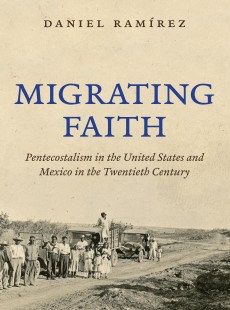
Migrating Faith
Pentecostalism in the United States and Mexico in the Twentieth Century
Ram
 Publisher: University of North Carolina Press
Publisher: University of North Carolina Press
Imprint: The University of North Carolina Press
Published: 09/2015
Pages: 306
Subject: Religion, Social Science, History
| University of North Carolina
Print ISBN: 9.78E+12
eBook ISBN: 9781469624075
DESCRIPTION
Ramirez argues that, because of the distance separating the transnational migratory circuits from domineering arbiters of religious and aesthetic orthodoxy in both the United States and Mexico, the region was fertile ground for the religious innovation by which working-class Pentecostals expanded and changed traditional options for practicing the faith. Giving special attention to individuals' and families' firsthand accounts and tracing how a vibrant religious music culture tied transnational communities together, Ramirez illuminates the interplay of migration, mobility, and musicality in Pentecostalism's global boom.




